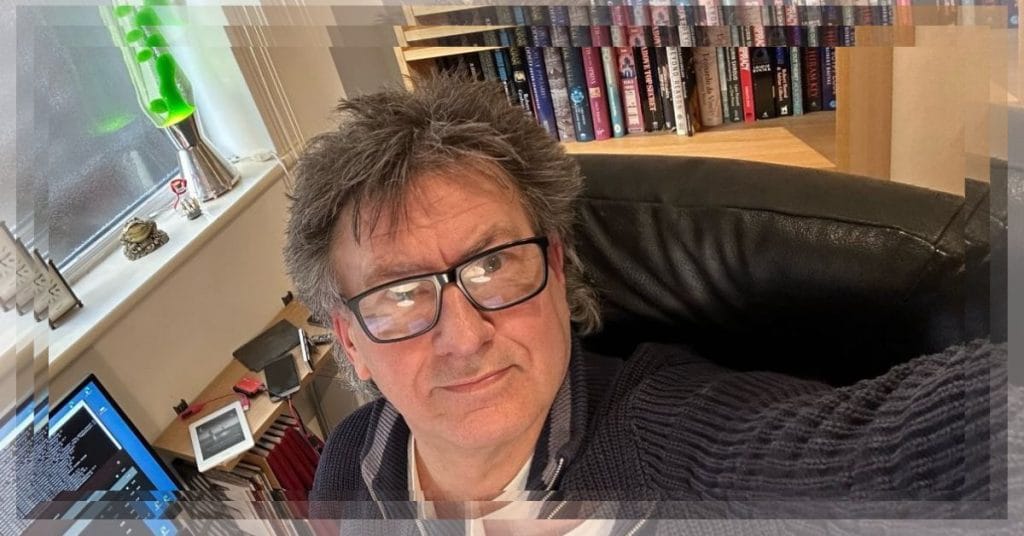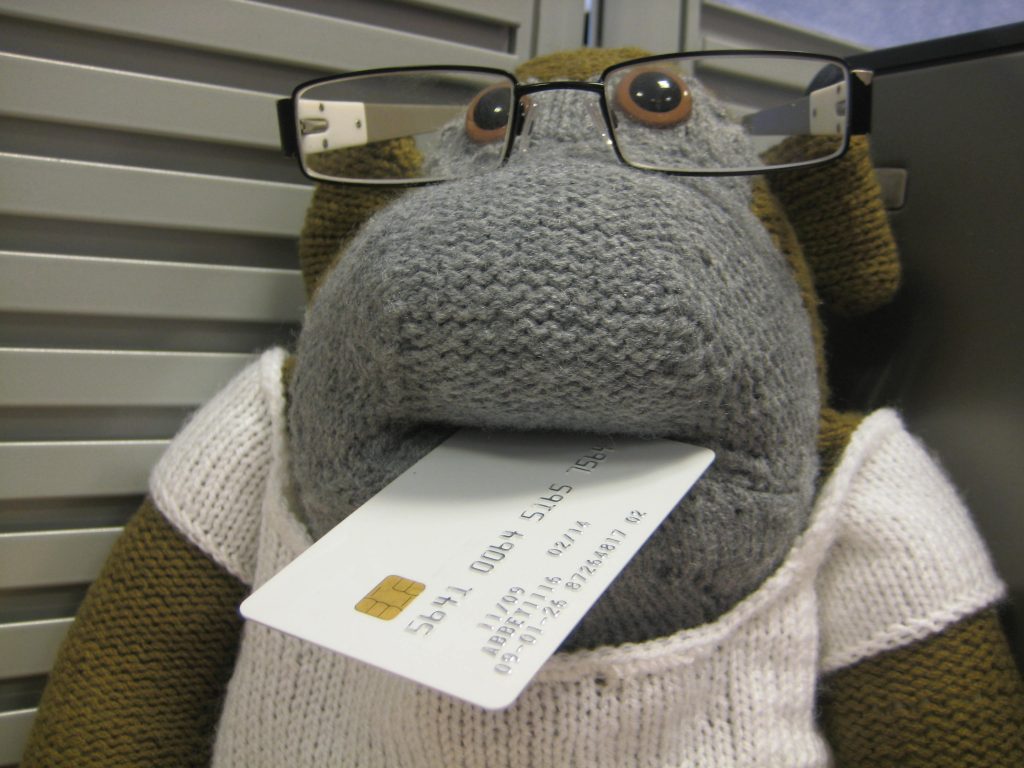I wanted to write this to capture the experience whilst it was fresh in my mind, thereby limiting the inevitability of it fading away as memories sometimes do. I wanted to record the sequence of events to give readers an opportunity to follow the timeline, and as an intellectual exercise confirming my continued ability to think! It might also serve as an intellectual reference point for the future.
The bulk of the content was written within a couple of days of the episode, in both note form and in longer format narrative, with a couple of bits inserted as Tina identified some plot discrepancies.
Start the Day
I began a fairly standard working day, catching up on some “to do” list items that had been identified as being in need of a fix – and it also began with a bit of a headache. The headache was far from being unbearable, but it was accompanied by a point of shimmering light in the lower left region of my vision. The bright, shimmering spot began to spread, morphing into a reverse arrow shape [ < ] that was getting bigger over time, still shimmering but without causing any particularly significant impact on my ability to see.
A History of Shimmering Lights
These shimmering lights, which eventually culminate in a headache, have affected me periodically for almost as long as I can remember – one of my early recollections was in school, in a maths lesson in around 1975, so they have been around for a while. They used to occur maybe once a year or so, but over the past decade they have gradually been increasing in frequency to possibly three or four times a year.
They are clearly on the increase, and I have tried to monitor and match them to preceding activities and food, but with no obvious pattern emerging.
I always supposed that it was some kind of migraine, people report that migraine is often associated with shimmering lights. In my case, the shimmering lights usually resulted in a headache for a day or so, but with no apparent lasting effects. I assumed this was migraine.
Kicking Off
It was approaching midday, and I was just finishing off something or other. I wanted to finish what I was doing before sitting back to watch “A Different Bias” with Phil Moorhouse – a political analyst and commentator, who happens to come from Doncaster.
This is how I can be clear about the time.
It was around seven or eight minutes past twelve, and I was approaching the keyboard with my right hand, when my right arm went dead, and flopped to the desk. I went to pick it up with my left hand.
I should say at this point that I don’t think that I had lost my ability to think!
There was no feeling in my right arm, so there was no feedback; my arm felt like a lump of meat, not connected to my body.
Interestingly, I didn’t feel anything because to be honest, the arm didn’t exist, except for the fact that I could see it. There was no numbness because to my mind, there was no arm.
I moved the arm and let it drop to the side of the chair. There was no movement and no feeling: there was really no concept of arm!
Gathering Thoughts
I can use the mouse in my left hand just as easily as if it were in my right, swapping hands mid operation should the need arise – I’m also left-handed with a TV Remote. This is important as we can disregard any challenges of driving the mouse with my left hand.
I had a blank google page open in the browser. I had just opened a new page and clicked “p” for paymentmonkey.net, and then my arm flopped.
I moved the arm and looked at the address bar, and I can confirm that I could see, read and understand what was in it: paymentmonkey.net. I recognised what was there but that wasn’t important now. I knew immediately that I wanted to look up the symptoms of stroke, and possibly the number for the NHS – ultimately, I was now looking for advice.
I knew what I wanted to do, and I was physically capable of driving the mouse, but what I found was that I was unable to complete the process. There was a difficulty, I was able to drive the cursor in the direction of the address bar, but it was no good because I couldn’t work out which buttons on the keyboard needed pressing. I knew it was a keyboard, and I knew what I needed to do. I couldn’t translate what I needed to do into actionable words, and without actionable words, which letters would I press?
At the conceptual level, I fully understanding what I wanted to accomplish: I needed information, I needed to formulate a question and write something in the address bar and then press enter.
I couldn’t find the words that I needed to turn my conceptualisation of my needs into executable instructions, the truth is that I could not find ANY words! You know that feeling when you have a word on the tip of your tongue, but you just can’t grasp it; the word that you need is just out of reach. You know it’s a word that you know, and it frustrates because it’s on the tip of your tongue. For me, the words were not on the tip of my tongue, because I didn’t know the words! They weren’t just out of reach; they just weren’t there!
I knew exactly what I needed to do, but I couldn’t translate the concepts into words, and all this time, I was visualising what needed to be done but was unable to provide my own narrative.
Into Action
I pushed back in my chair and swung around to face the door. I lifted my right arm onto my lap and considered my next move – two or three minutes had gone by.
So far, I have managed to remain focused, and I have been able to think clearly – at least I thought so – without any degree of panic. I guess that, without knowing it, I had entered self-preservation mode.
It was now around ten minutes past twelve – I was still seated, facing towards the door and considering my next move of transferring myself to the settee – when my left arm jerked forwards, fell back to its resting position and then rapidly came back to life.
I rubbed my hands, together. The feeing had returned, and my arm belonged to me.
I picked up the mobile phone, in my left hand, and made my way to the living room – all motor functions were operating correctly, and I positioned myself on the sofa to reflect and recompose myself.
I needed help.
I managed to call Tina. I was holding the phone in my left hand, I flicked my thumb upwards – the phone recognised my face – and pressed the bottom left phone icon, it opened on Favourites and I pressed the Tina button.
A Lack of Communication
It was 12:15, I know this because the phone logged the call, and luckily, Tina answered.
She said “Hello”, and then I found myself unable to speak!
All I could manage was a drawn-out grunt, “Eerrrrrrrmmm”.
Conceptually, I knew exactly the message I wanted to convey. I needed her to come home as I was in trouble, and I was fully cognisant of what that trouble was. However, speaking on the phone added the additional symptom of not being able to speak.
I was fishing for words, but it was like I was fishing without a line, and I felt I was unable to catch them. If you haven’t got the words, you can’t drive your mouth. It didn’t cross my mind that I was unable to speak; all that crossed my mind was that I couldn’t think of anything to say!
She asked me what was wrong, but all I could manage was more of the same, “Eerrrrrrrmmm, Eerrrrrrrmmm”. She told me afterwards that she thought I had something difficult to tell her and was trying to establish the best way of saying it. She wasn’t expecting anything like this, and there was no reason to.
After what seemed like an extended period of questions followed by null responses (“Eerrrrrrrmmm, Eerrrrrrrmmm”) that was in fact only a matter of seconds, it dawned on her that something was wrong, and she said she was coming home – mission accomplished!
The call was logged as lasting for less than one minute.
Follow Up
Tina works in Hertford, and as we live in Hertford Heath, she was home inside 10 minutes.
The car pulled up, and the time by now would have been around 12:25, she opened the front door and joined me in the living room where I was sitting on the settee, still composing myself. I looked fine and I looked composed, but in response to any of her questions, I remined unable to speak.
She realised that there was indeed a problem, and asked if she should call for an ambulance. Being without words but with a full grasp of the question and the situation, I nodded, with a distinctly concerned look on my face.
By half past twelve, 999 had been dialled, the ambulance had been called, and the paramedics were on their way, then she called Annabelle.
My First Words
As I sat, still composing myself, I felt like I might benefit from some refreshment. I managed to cast my beverage requirements into the vocabulary pool and fished out my first word. Having first conceptualised my needs, I connected the concept to the word. I was then able to materialise, verbalise and externalise the word by using that word to drive the mouth!
My first word was “tea”.
I was calm. Maybe I was calm because I was unable to find any words for panic.
Annabelle arrived and I was still having difficulty finding words to speak with, in fact I had said nothing more. This was maybe going to last a while, but I still felt no frustration – weird!
I was shivering a little, it was a cold day and maybe I was suffering a little bit from shock. I managed to say, after a good deal of thought, “I … cold”. I had managed to string together a two-word sentence of sorts that had a subject and an adjective, I had conceptualised my predicament and I gone fishing for the necessary words. Whilst I managed to catch only a couple, and they were minnows, they encapsulated my situation and had the desired effect of procuring for me a quilt.
Trying to Write
I tried to gesture for a pencil and paper, but my charades skills are minimal. I thought perhaps that even if I was unable to speak, I might be able to write.
Annabelle provided pencil and paper, and I duly attempted to communicate in writing.
I wrote a word; it didn’t make any sense, and it didn’t look right, and I scribbled it out. I tried another word, and I scribbled that one out too.
I could spell David, but I couldn’t quite grasp the spelling of “Annabelle”. I was unable to write a sentence, I think because at this point, I was still unable to think in sentences.
My ability to conceptualise what I wanted to say was unaffected, but I couldn’t locate the words that would allow me to express those concepts. It was like seeing and comprehending but not being able to describe what you see.
I had a pen, and I had paper, but I was unable to write anything particularly useful. I could work the pen, and having written, I could identify my mistakes. I was crossing out the mistakes like an expert, but I could not extend my mind to the paper. If I was told what to write, and if the writing didn’t involve any complex thought processes, I could write (on the whole).
I seemed like the problem was in the activity of fishing for words, regardless of whether they were to be used for verbal or written communication. There was a gap that needed bridging.
Paramedics are Cool
The paramedics appeared at around ten minutes past one.
They tested my ability to follow a finger, they tested my arms and legs for movement and resistance, and they tested my ability to walk around without falling over. All was fine, apart from my ability to communicate; my arm had recovered a long time ago and I was calm.
I had no problem with any form of comprehension, but I was unable to verbalise without written or pictorial cues.
We performed some of the tests outside, the Paramedics were in video contact with the Stroke Team at Lister Hospital and the signal in the house was poor. The Stroke Team assessed the situation by video call in the garden, and I was put through my intellectual paces in terms of balancing with my eyes closed without falling over, closing one eye and then the other before touching my nose and then touching the paramedic’s finger, and doing a bit of reading.
I was OK with everything except verbalisation from a standing start.
With the assessment completed, it was Blues and Twos to Lister Hospital, arriving in the stroke unit by two o’clock.
To Hospital and Beyond
Here we are, in the right place, less than two hours after the attack.
I was admitted via the A+E entrance, by virtue of the Blues and Twos and the fact that I was an emergency!
After being wheeled in on a paramedical wheelie stretcher to the stroke assessment area, the first port of call was the CT scanner for a swift look inside my head.
Whilst this was taking place, Tina was busy completing the admission process, confirming my details with the nursing staff. It was probably just as well, as I wasn’t stringing words together.
I did note that if the CT scan had shown something amiss, like bleeding on the brain, then the subsequent actions of the medical staff might well have taken a substantially different direction, although I suspect the damage would have already been done. They presented me with four aspirin and a drug to prevent damage to the stomach lining caused by the aspirin. I think that I was also given another capsule at some point later.
Once again, I feel I must mention that throughout the whole experience, from the initial episode to being assessed in the assessment area, and afterwards, I didn’t lose any intellectual capacity – still couldn’t speak though.
A Time for Testing
I was given a series of simple tests: picture (object) recognition, word recognition, and picture comprehension. I was also asked to name as many animals as I could in a minute, followed by as many countries as I could name in a minute. Periodically, I was asked where I was, the day of the week, the month, my name and my Date of Birth.
I managed the picture recognition, there was a feather, a key, a chair, a hammock and a couple of other things that I forget now – I have since looked up the picture and the items I couldn’t remember were glove and cactus, this was a memory lapse as I do remember naming all of them correctly.
I managed the reading of a series of words and short sentences, there was nothing complex and a couple of the tests were words that were repeated and separate by a hyphen. I don’t believe that I had any difficulty recognising the words, and then saying them out loud.
I was starting to find it easier to write sentences on the iPhone and then read them out to Tina, although the challenge of casting the net and fishing for words remained. Whilst the difficulties remained, it did seem to be a little easier to break up the process and convert thoughts to writing prior to verbalisation than trying to convert thoughts directly to verbalisation.
It felt like collecting the words together in sequence prior to saying them them reduced the intellectual pressure of combining the conceptualisation and verbalisation stages.
I was shown a picture of a kitchen scene, it was a set of kitchen units running around the corner of the kitchen, with a window to the right and a tall cupboard to the left. The sink was in front of the window and the tap had been left running, resulting in the water overflowing over the floor. A lady was standing by the sink holding a plate and drying it with a tea towel. To the left, and behind her as she was standing, were two children. A boy was climbing on a stool, attempting to reach a “Cookie” jar on the top shelf of the open cupboard. The other, a girl, had knocked the stool, causing it to tip.
I was fully able to comprehend the picture, and I have remembered it from Wednesday through to Saturday, as I am writing this, and I only saw it for a matter of a minute or so. I have since looked up the picture on one of the NHS websites and the description is spot on.
Whilst I was able to comprehend the scene, and was also able to consider the future implications insofar as the kitchen would flood and the boy would hit the floor, I was unable to describe the scene in any detail or verbalise any of the future consequences. I think the limit of my verbalisation capabilities were limited to a few single words: I think I said “sink”, “spill”, “Cookie” (which was spelt out on the tin), “topple”, but was unable to engage in any meaningful sense.
I was then asked what was likely to happen next in the picture, which was obviously a reference to the sink spillage and the cookie jar toppling, but whilst I completely understood what was likely to happen, and the request for comment, I was unable to verbalise.
So, I was able to name objects, read words aloud, comprehend pictures but I was unable to turn abstract thought into representative verbalisation.
I was asked to name as many animals as I could in a minute, I struggled. I got as far as rabbit, stoat, bunny, elephant and giraffe, and then ground to a halt. I was then asked to name as many countries as I could in a minute. I began with Portugal, Spain, England, Germany, Sweden, Russia, Kazakhstan, Afghanistan, Pakistan, Indonesia and Australia.
The animals challenge was like pulling rabbits out of random hats and I was struggling. In this case, I felt I was unable to access the set of animals that were known to me, it was as if I had no key.
The countries challenge was slightly different; in this situation, I held a key in my mind, and the key was a map. I was able to visualise a map of the world and then work my way from West to East.
I had no equivalent key to the animals challenge, I wonder, if I had been a biologist that I would have had a map of genus and species to guide me?
Interesting, I wonder if that’s a subtle part of the test.
A Time for Bed
After being given aspirin and a couple of other drugs, one of which was a pill to prevent the aspirin wreaking the stomach lining, I was admitted, and it must have been around three o’clock.
When I say “admitted”, what I meant was that I was wheeled into one of the A&E side rooms to await onward travel to a suitable ward, and bed. Tina says that I keep forgetting this part of the experience, but I think it was because it wasn’t particularly memorable. We were left in the side room with few distractions other than the machine that goes ping, and a visit now and then from a nurse keen to take my blood pressure.
Apparently, we were waiting for around three hours, during which time I possibly had a sleep. As we approached the here hour mark, I had a cup of tea, Tina had a hot chocolate, and I managed to avail myself of a ham sandwich. It was welcome but it wasn’t like the food and drink broke the inevitable monotony of hanging around, because as soon as the food and drinks were served, I was loaded onto a chair ready for the promised onward travel. I had taken one bite of the ham sandwich.
I was wheeled along the corridors, taken up and down in the lifts and then wheeled along more corridors to what I thought must be the stroke ward, where I was manoeuvred into a side room and hooked up to another machine that goes ping!
Throughout this time, I was gradually finding more words and was managing to construct increasingly complex sentences. I had gone from basic instructive and informational constructs like “Tea”, to “I cold” to regaining some of my ability to work in the abstract, developing ideas and then adding words.
I kept returning to the kitchen scene. I remembered everything that was taking place, and I tested myself on my ability to verbalise the situation and the consequences of the overflow and the rocking stool.
My ability to communicate was improving all the time, and I managed to procure some tea and another sandwich.
Left to my Own Devices
I was installed in a side room and Tina left at around six or seven o’clock, time wasn’t quite as critical now.
I was regaining the ability to converse, but I had still had difficulty bringing less-used words to front of mind where I could use them. Even so, it was a vast improvement on the early afternoon.
In bed, I was plugged into the heart monitor, and the blood oxygen monitor, and there was also a blood pressure monitor that repeatedly failed due to an ineffectual valve. It was supposed to check blood pressure every hour, automatically. Sometimes it worked and sometimes it didn’t.
There were also several mobile, stand-alone Blood Pressure monitors.
One stand-alone blood pressure monitor consistently gave low readings. It was clear to me that the device wasn’t inflating the cuff correctly. It would increase the pressure in the cuff normally, and then drop the pressure prematurely, which would result in a low reading. My blood pressure was reasonable constant, except for the duff readings, and I could tell the readings were going to be duff by the feel of the cuff!
The nursing staff showed very little interest in attempting to rectify the situation, I guess they are too busy, but at one point, the reading was so low that the nurse taking the reading was about to set off in a panic to seek help, until I called her back to try again.
The issue here was that no one was prepared to listen as they were medical professionals, and I was a patient! The relationship between medical practitioners and patients is well known and understood, and the opinions of patients are secondary. However, if I had not made a fuss, then I would have been recorded as having highly fluctuating blood pressure and would possibly have been diagnosed incorrectly, resulting in unnecessary medication.
I may have lost the ability to communicate effectively, but didn’t lose any analytical or cognitive abilities.
Losing Thursday
I spent Thursday, lying on the bed wearing massage stockings and watching videos, with the occasional discussion about political stuff with one of the student nurses.
The stockings they referred to – and I was so looking forward to some tight anti-thrombosis big socks like those provided on long-haul flights to nowhere – turned out to be pneumatic contraptions that applied pressure, and then released it, on a 3-stage cycle between ankle and thigh. So, with both legs connected via tubes to an air pump that would put the blood pressure monitor to shame, I lay back and waited for lunch.
I had a conversation with one of the student nurses, beginning with Bitcoin and moving on to immigration! He was convinced that Bitcoin was a sound investment and was telling me that he was putting all his spare cash and savings into it. He was also of the opinion that it should become a global means of making everyday purchases.
What I also found interesting was that he was working for the NHS but was convinced that immigrants were the cause of all our troubles, and that the super wealthy should be able to keep all their money because they have earned it.
I am not making political judgements; in the course of discussion, I was trying to present an argument using Central Banks as a focal point, to highlight the distinction between cryptocurrency supported and issued by Central Banks and cryptocurrency supported by little more than hype. Whilst I knew that I wanted to discuss cryptocurrency in relation to a Central Bank, and I fully understood the concept of a Central Bank, I was unable to reach out and grasp the term “Central Bank”.
Let me try and explain. The concept was clear in that I knew what I wanted to say, but it got stuck, if you like, just before verbalisation. Now we probably all understand what we mean when we say that something is on the “tip-of-the-togue”, but that implies that the words are ready and waiting, like you might reach out and grab them, metaphorically of course. Here, whilst I knew what I wanted to say, the words were not on the tip of my tongue; it was like they were in another room, available but stuck behind the door. This was around midday, 24 hours after the episode.
Later that evening, the door had opened and my difficulties in moving from conceptualising to verbalising the term “Central Bank” had evaporated, showing that most of my cognitive abilities had returned. More on that later!
Going Home
Friday saw me pretty much back to normal, and it had been hinted that Friday was probably going to be the day for going home.
I was given my breakfast of tea, porridge and a marmalade sandwich at 7:15 and then advised that I was due to have a Doppler Scan at 7:30.
No time for tea, the pneumatic “stockings” were disconnected, and I was unhooked from the machine that goes ping. I was given my dressing gown and then loaded into a wheely chair ready for the porter. It was a long way from the ward to the place where they do the Dopler probing, and it involved the lift and a certain amount of disorientation. I was finally deposited in the space where the patients do the waiting and was left to do the waiting.
The Dopler experience passed without incident. The carotid arteries were not showing any particular cause for alarm, and I was reparked in the waiting area, awaiting the return of the returning porter.
When I had entered the Dopler Room, the waiting area had been pretty much devoid of people waiting; for a while, I had been the only patient in attendance, and it had been quiet. On my return, there were outpatients waiting and there were several patients in beds. It was noisy, I had a conversation about Donald Trump, and I could hear people moaning and becoming upset that they were being ignored by the medical staff. The medical staff were not ignoring them.
I returned to find that I had been ejected from my single-occupancy room; my bed had been moved and all my things had been deposited in the corner section of the main ward. They had needed the room.
My breakfast had also made the trip, more porridge was provided, and the tea was replaced, the bread for the marmalade sandwich was beginning to dry out but in the big scheme of things, I didn’t think it mattered.
There were people around me now that were in a much worse state than I had ever been. Some needed to be fed and were in a bad way, and the guy in the next bed, who had recently suffered is second or third stroke, was being supported by a speech therapist. He didn’t appear to have lost his faculties, but his ability to stay on subject was a little wavering, taking tangents and not returning. I couldn’t see as there were curtains around the bed, but I could hear – I don’t suppose being supported by a speech therapist was helped particularly by a speech therapist with a speech impediment.
Time passed and I was told that I could get dressed, pack my things and prepare myself for my return to the outside world. I had some lunch, fish and chips and a crumble and custard, and tea, and then I had a conversation with the consultant, the pharmacist and the discharge person.
The consultant told me that I was essentially good to go, he explained the function of the drugs and the dosages, and he told me that the statins might cause nightmares – something to look forward to.
The pharmacist arrived with a trainee pharmacist in tow, and the pharmacist asked me if I would allow the trainee to tell me all about the medications. She told me all about it and then locked the drugs in the bedside drawer, to be released on my release.
I wasn’t going to be allowed to make my own way home; I needed to be collected, or else I would need to be delivered by hospital transport. That bit I didn’t understand fully, but wasn’t going to question the logic as Tina was my transport, and I had already called her to arrange.
I was given the discharge papers, handed the drugs from the locked drawer, and hopefully for the last time, I became the occupant of a chair and passed into the care of a porter.
It was just as well that I was being portered to the discharge area as the directions would have been particularly challenging, and I might easily have found an alternative exit.
I was discharged, Tina found me, eventually, and we returned home.
End Game and Follow Up
I’ve consulted with Dr Google, and I have established that a Transient Ischemic Attack (TIA) is caused by a blood clot creating a brief blockage in the flow of blood to part of the brain. It causes temporary stroke-like symptoms, but unlike a stroke, a TIA doesn’t damage brain cells or cause any permanent disabilities. It would appear that as soon as it forms, the offending blood clot starts to break down, and so the symptoms of the attack begin to rectify themselves almost immediately, but they may persist for up to 24 hours or so.
I am no medical practitioner, but as far as I can tell, there are essentially two forms of stroke: Ischemic Stroke and Haemorrhagic Stroke. The Haemorrhagic Stroke, as its name might suggest, is caused when a blood vessel in the brain bursts, causing blood to leak into the brain, which can damage brain tissue; an Ischemic Stroke is caused when a blood clot or a narrowed blood vessel restricts or blocks blood flow to the brain.
I guess this is why a TIA is referred to as transient. A stroke caused by a severe blood clot that doesn’t break down quickly, is going to destroy brain cells permanently, and therefore isn’t transient at all. This will be why a TIA is considered an early warning sign that a person is at risk of a stroke – this would be an Ischemic Stroke rather than Haemorrhagic.
I had thought that strokes were generally of the Haemorrhagic type, and didn’t appreciate why a TIA would be an indicator of a person being at risk. Now that I understand the nature of the Ischemic Stroke, I understand the risk associated with having a TIA, and the resulting need for aspirin, cholesterol-reducing drugs and blood thinners.
About 1 in 3 people who experience a TIA go on to experience a stroke, and the risk of stroke is especially high within 48 hours of a TIA. I suppose that if a small blood clot found its way to the brain, causing the TIA, there may well be others about to break loose of their moorings, and head in the same direction. It now makes sense that the first thing that I was given in the hospital was aspirin, and I was handed four of them. It also makes sense for me to have been detained at the Health Secretary’s pleasure for essentially all the 48h high-risk period.
I was prescribed aspirin for the first 21 days, and a drug to prevent the aspirin burning a hole in my stomach lining, and I am prescribed Atorvastatin and Clopidogrel for the rest of my life … or until I get better!
Review
It happened, but at no time did I feel afraid. I have spoken to people who have said that it would have frightened them, and I suppose it should have frightened me.
I wonder if it was something to do with not being able to put into words any of my conceptual thinking. I was unable to speak because I was unable to capture the words necessary to drive the mouth; perhaps I was unable to feel any fear because I was unable to verbalise that fear. I have to say that I don’t feel this to be likely as I don’t recall experiencing any conceptualisation of being frightened, and as the episode unfolded, I felt that I my primary focus was to get to the next step.
I was aware that I needed help.
My first attempt was to drive the mouse to the information available online, and when that didn’t produce any results, my next move was to retire to the living room and call Tina. That was successful, she came home, and I passed the responsibility for my welfare over to her.
The use of my right arm returned almost immediately, it flopped, it jerked a bit and then it was good to go!
What I find fascinating is the recuperation of the mind. At no point did I lose any mental capacity, I could see, I could hear, I could understand what was being said to me, but my ability to communicate verbally was suffering. I couldn’t speak and I couldn’t write.
As part of the diagnosing and recovering process, I was given tests. I was shown some words, I could see the words and I could read words aloud, so no difficulty here. I was also shown pictures of objects, I could see the pictures and I could name the objects out loud. I was shown a kitchen scene and asked to describe it, and to predict the future outcome of some activities going on in the picture. I fully understood but was unable to verbalise much of a response.
It was like there was a gap between the process of understanding and the process of verbalisation, and this has probably taken the longest time to resolve, with more abstract thinking taking the longest
I had a look, evidence would suggest that some people experiencing a TIA may also experience more longer lasting impairments such as fatigue, depression, anxiety, cognitive impairment, and communication difficulties. It also appears to be the case that these impairments often go unrecognised and may therefore be inconsistently treated.
My inability to verbalise the term “Central Bank” after 24 hours had resolved itself, but I to have some difficulty responding to complex conversation, and to questions that required complex responses. I had an interview at around the two week point and I could feel from my responses to questions that were not particularly complex, that the gap between thought and verbalisation had not yet closed.
Looking back, I think I assumed that I would recover. It never crossed my mind that I wouldn’t, but I am now left wondering what it may have been like had I not recovered. My thought processes were unimpaired, and I was in no pain or under any stress, but what if I were permanently unable to bridge the gap between conceptualisation and verbalisation?
For a while, I was unable to communicate with the outside world.
What if that had been permanent?
It doesn’t feel like communication is a problem now, and I don’t believe that I am suffering from any memory problems, but then how would I know? I don’t think that I am having any trouble with what they call executive thinking, and I am not suffering any emotional symptoms like irritability or anxiety. Overall, I don’t think I am showing any signs of mental decline, and the one that I am aware of appears to be waning.
If I were in decline, I probably would not have been capable of writing this account of my experience, and my thoughts about the mental processes that were impacted.
The proof of the pudding is in the eating.








